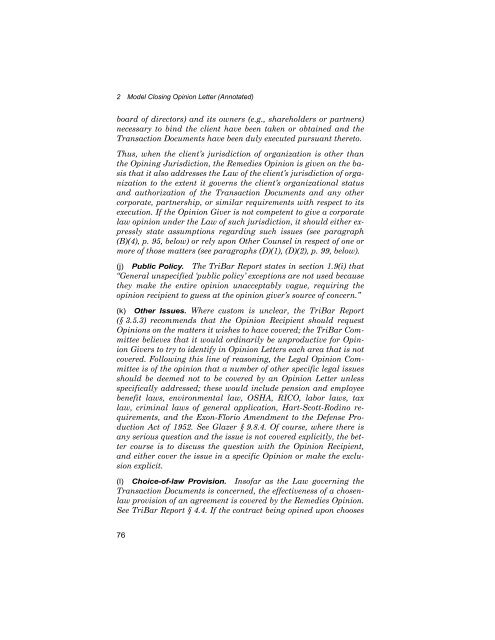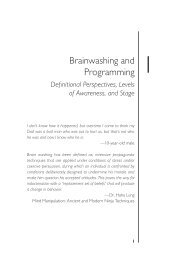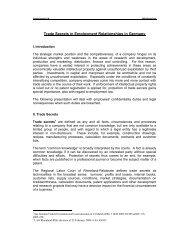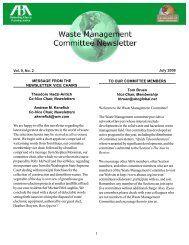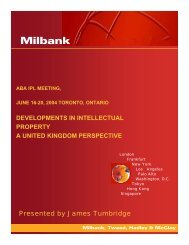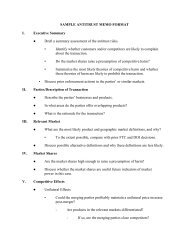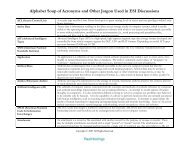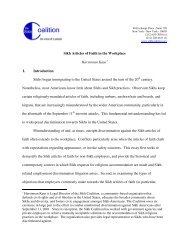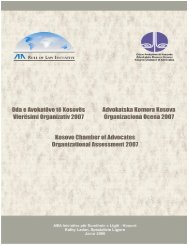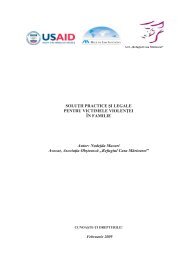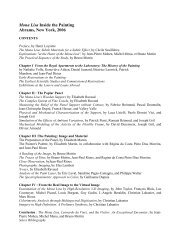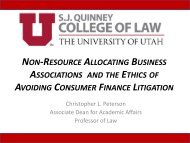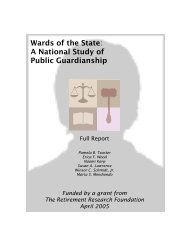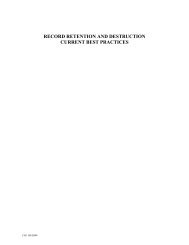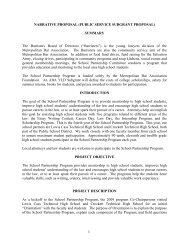Model Closing Opinion Letter (Annotated) - American Bar Association
Model Closing Opinion Letter (Annotated) - American Bar Association
Model Closing Opinion Letter (Annotated) - American Bar Association
You also want an ePaper? Increase the reach of your titles
YUMPU automatically turns print PDFs into web optimized ePapers that Google loves.
2 <strong>Model</strong> <strong>Closing</strong> <strong>Opinion</strong> <strong>Letter</strong> (<strong>Annotated</strong>)<br />
board of directors) and its owners (e.g., shareholders or partners)<br />
necessary to bind the client have been taken or obtained and the<br />
Transaction Documents have been duly executed pursuant thereto.<br />
Thus, when the client’s jurisdiction of organization is other than<br />
the Opining Jurisdiction, the Remedies <strong>Opinion</strong> is given on the basis<br />
that it also addresses the Law of the client’s jurisdiction of organization<br />
to the extent it governs the client’s organizational status<br />
and authorization of the Transaction Documents and any other<br />
corporate, partnership, or similar requirements with respect to its<br />
execution. If the <strong>Opinion</strong> Giver is not competent to give a corporate<br />
law opinion under the Law of such jurisdiction, it should either expressly<br />
state assumptions regarding such issues (see paragraph<br />
(B)(4), p. 95, below) or rely upon Other Counsel in respect of one or<br />
more of those matters (see paragraphs (D)(1), (D)(2), p. 99, below).<br />
(j) Public Policy. The Tri<strong>Bar</strong> Report states in section 1.9(i) that<br />
“General unspecified ‘public policy’ exceptions are not used because<br />
they make the entire opinion unacceptably vague, requiring the<br />
opinion recipient to guess at the opinion giver’s source of concern.”<br />
(k) Other Issues. Where custom is unclear, the Tri<strong>Bar</strong> Report<br />
(§ 3.5.3) recommends that the <strong>Opinion</strong> Recipient should request<br />
<strong>Opinion</strong>s on the matters it wishes to have covered; the Tri<strong>Bar</strong> Committee<br />
believes that it would ordinarily be unproductive for <strong>Opinion</strong><br />
Givers to try to identify in <strong>Opinion</strong> <strong>Letter</strong>s each area that is not<br />
covered. Following this line of reasoning, the Legal <strong>Opinion</strong> Committee<br />
is of the opinion that a number of other specific legal issues<br />
should be deemed not to be covered by an <strong>Opinion</strong> <strong>Letter</strong> unless<br />
specifically addressed; these would include pension and employee<br />
benefit laws, environmental law, OSHA, RICO, labor laws, tax<br />
law, criminal laws of general application, Hart-Scott-Rodino requirements,<br />
and the Exon-Florio Amendment to the Defense Production<br />
Act of 1952. See Glazer § 9.8.4. Of course, where there is<br />
any serious question and the issue is not covered explicitly, the better<br />
course is to discuss the question with the <strong>Opinion</strong> Recipient,<br />
and either cover the issue in a specific <strong>Opinion</strong> or make the exclusion<br />
explicit.<br />
(l) Choice-of-law Provision. Insofar as the Law governing the<br />
Transaction Documents is concerned, the effectiveness of a chosenlaw<br />
provision of an agreement is covered by the Remedies <strong>Opinion</strong>.<br />
See Tri<strong>Bar</strong> Report § 4.4. If the contract being opined upon chooses<br />
76


